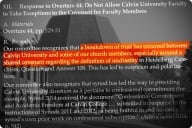You have /5 articles left.
Sign up for a free account or log in.
It turns out that students and faculty members aren't the only ones seeking more information about an arrangement between Fort Hays State University and a company that sells online general education courses for $99 each. The arrangement was a surprise to Fort Hays' accreditor, the North Central Association of College and Schools, which is now asking questions.
North Central is also examining the company's relationship with two for-profit institutions it accredits: Ellis University and Grand Canyon University. The company, StraighterLine, offers the courses online and these institutions pledge to award credit to those who successfully complete them, even though the courses are taught by instructors hired by StraighterLine, which is not a college and does not have accreditation.
Karen L. Solinski, director of legal and governmental affairs for North Central, said no conclusions had been reached about whether there was anything wrong with the relationships. But she said that officials learned of the ties only when they read an article last week in Inside Higher Ed about opposition to the arrangement at Fort Hays State.
"When we saw the article, we naturally had questions," Solinski said, so requests for information have been sent to the three universities. Solinski said that, at this point, she doesn't have enough information to know which of the accreditor's policies may apply to the situation. Generally, she said, colleges have considerable autonomy to decide which transfer credits to accept. But she said that different rules apply when the credits are coming from "unaccredited agencies," and not accredited colleges.
Solinski said another issue may be the faculty role in the curriculum. "It depends on the institution," she said, adding that "we think the faculty have an important role in the approval of curriculum."
At Fort Hays, while some faculty members were involved in reviewing the deal with StraighterLine, there was no formal approval process, and the English department has expressed concern about whether the composition courses offered by StraighterLine in fact are of the same level of rigor as those offered at the university.
The theory behind StraighterLine is that many colleges have poor track records at teaching general education courses. If StraighterLine can do a better job, and selected colleges like Fort Hays grant credit, those colleges may be attractive places for the StraighterLine students to transfer to finish their degrees. Because StraighterLine courses are inexpensive, supporters say that it provides a good option for some students and limited risk of big debts for students who don't do well. Many higher education experts have suggested that the model used by StraighterLine -- in which professors design courses, but don't coach students through them -- has promise. But at Fort Hays, students have organized opposition to the arrangement, saying that it will devalue their degrees, which they feel are based on close student-faculty interaction.
A spokesman for Grand Canyon confirmed that North Central has contacted the university's president and that a conference call is being scheduled to discuss the matter later this month. A spokeswoman for Ellis did not return phone calls about StraighterLine.
Lawrence V. Gould, the provost at Fort Hays, said he had spoken to North Central on Thursday and that the accreditor was "doing exploratory research." Gould said that he didn't see StraighterLine as being any different from the many other institutions that students attend before transferring credit to Fort Hays. Gould acknowledged that the faculty had never signed off on all of the courses and that there are objections, particularly to one composition course being offered. But he said that English professors would work with StraighterLine to "do some readjustment of learning outcomes," and that he anticipated everyone then being satisfied.
Gould said that he personally has been impressed with the quality of courses produced by StraighterLine.
Asked why he didn't tell North Central about the arrangement before starting it, Gould said that "there didn't seem to be a need."
Burck Smith, the CEO of StraighterLine, said he would welcome North Central if it would like to evaluate his courses. StraighterLine recently asked the Distance Education and Training Council, an accrediting body, to evaluate its courses, and the council found that they met or exceeded its standards. The council is a national accreditor, not a regional accreditor like North Central. Smith said that if a regional accreditor would be willing to conduct the same review, he would be pleased, but that he could only find a national accreditor willing to do so. (While advocates for different accrediting bodies dispute their relative quality, regional accreditation is the norm for nonprofit colleges while many for-profit institutions prefer national bodies.)
Smith said he had no concerns about a quality review of his courses, but that he did worry about "whatever political elements might enter the equation."
As to whether colleges that set up relationships with StraighterLine should report those those arrangements to their accreditors, Smith said "it's their decision to make."
At least one StraighterLine college -- Potomac College -- did inform its accreditor about the arrangement, and the Middle States Association of Colleges and Schools approved it.
StraighterLine is not the only company entering into relationships to provide content or courses to colleges.
Higher Ed Holdings, a Texas-based company, is providing online master's programs in education at Arkansas State and Lamar Universities, with some controversy at the former. And the company withdrew from negotiations with the University of Toledo over a similar program when faculty members there objected. Lamar did flag the relationship for the Southern Association of Colleges and Schools, which is preparing to review the program there.








